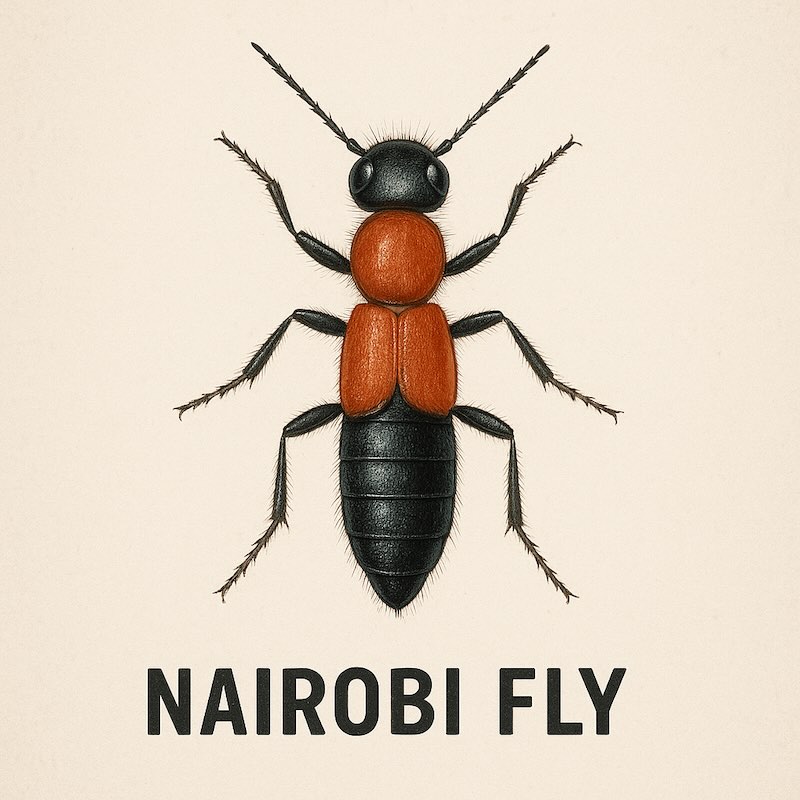Kathmandu, Nepal – With the arrival of warmer, more humid weather, residents of the Kathmandu Valley are increasingly encountering a small, seemingly innocuous insect known as the Nairobi fly. While it doesn’t bite or sting, this insect can cause a painful skin condition called Paederus dermatitis. Derma Clinic Kathmandu is issuing this advisory to help the public understand, prevent, and treat this condition.
What is the Nairobi Fly and Paederus Dermatitis?
The “Nairobi fly” is a common name for several species of rove beetles belonging to the genus Paederus. These insects are characterized by their distinct orange and black coloring. They are attracted to light and are often found in damp environments.
The problem arises not from a bite or sting, but from the accidental crushing of the insect against the skin. When crushed, the Nairobi fly releases a potent toxin called pederin from its hemolymph (insect blood). This toxin is a strong blistering agent that leads to a condition known as Paederus dermatitis.
Symptoms and Telltale Signs
The reaction to pederin is not immediate. Symptoms typically appear 12 to 36 hours after contact and can include:
- A sudden, burning or itching sensation.
- The appearance of linear or “whiplash” streaks of red, inflamed skin.
- The development of small blisters that may fill with a yellowish fluid.
- In some cases, a “kissing lesion” can occur where the affected skin comes into contact with another part of the body, transferring the toxin.
The affected areas are most commonly on exposed parts of the body like the face, neck, arms, and legs.
Effective Treatment for Paederus Dermatitis
If you have come into contact with a Nairobi fly, it is crucial to act quickly to minimize the severity of the reaction:
- Wash the area immediately: Use soap and water to thoroughly cleanse the affected skin and remove the toxin.
- Apply a cold compress: This can help to soothe the burning sensation and reduce inflammation.
- Seek professional medical advice: It is highly recommended to consult a dermatologist for proper diagnosis and treatment.
At Derma Clinic Kathmandu, our experienced dermatologists can provide a tailored treatment plan which may include:
- Topical steroids: To reduce inflammation and itching.
- Topical or oral antibiotics: If a secondary bacterial infection develops from scratching the blisters.
- Antihistamines: To help manage itching.
Prevention is Key
The best approach to Paederus dermatitis is to avoid contact with the Nairobi fly in the first place. Here are some effective preventive measures:
- Know your insect: Familiarize yourself with the appearance of the Nairobi fly.
- Avoid crushing: If you see one on your skin, gently blow it off or guide it onto a piece of paper. Do not swat or crush it.
- Use screens: Keep windows and doors fitted with insect screens.
- Sleep under a mosquito net: This can provide a protective barrier during the night.
- Reduce lighting: Be mindful of bright lights, especially at night, as they attract these insects.
- Wear protective clothing: Consider long-sleeved shirts and pants when in areas where Nairobi flies are prevalent.
Potential Complications
While most cases of Paederus dermatitis resolve within a few weeks, complications can occur, especially if left untreated or if the affected area is excessively scratched. These can include:
- Secondary bacterial infections: Leading to increased pain, pus formation, and delayed healing.
- Post-inflammatory hyperpigmentation: The skin may remain darkened in the affected area for some time after the initial rash has healed.
- Eye infections: If the toxin is transferred to the eyes (a condition sometimes called “Nairobi eye”), it can cause severe conjunctivitis and requires immediate medical attention.
Contact Derma Clinic Kathmandu for Expert Care
If you suspect you have Paederus dermatitis or are experiencing any concerning skin condition, do not hesitate to seek professional help. The expert team at Derma Clinic Kathmandu is here to provide accurate diagnosis and effective treatment to ensure a speedy and complication-free recovery.
Protect your skin this season. Be aware, be prepared, and if in doubt, contact the experts.
Contact Derma Clinic Kathmandu today at 9801358600 to schedule an appointment.

